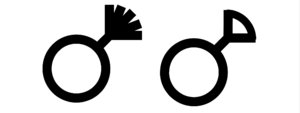Sissy
| |
This article has multiple statements without valid sources to support them. You can help the Nonbinary Wiki by adding sources to this article! |
| File:Exclamation mark white icon.svg | This page is about a gender identity that is not widely used among gender-variant people. This does not mean that the identity is not valid, but that very few people are known to use this term. More information on uncommon identities... |
Sissy is a term used to describe people who were assigned male at birth and embrace feminine roles and/or expression. A reclaimed slur, it retains connotations of censure that can be important to those using it as an gender identity label. The identity can fall under the genderqueer, gender variant, transfeminine, gender non-conforming, or nonbinary umbrellas depending on the individual’s identification with those terms.
When used as a gender identity, Sissy has overlap with some usages of the terms Androgyne and Epicene but is distinguished by its integral emphasis on gender privilege and power dynamics. Cultural diminishment of femininity, contempt for males who reflect it, and expectations of feminine deference to masculinity are all part of the point. A Sissy identity queers and subverts those structures while honoring the messiness and imperfection of individual humanity and identity. The identity has also been criticized as de facto buying-in to and, therefore perpetuating, those oppressive and limiting structures.
Sissy Identity can be controversial in the LGBTQIA+ community for other reasons as well:
- The word continues to be in common usage as a derogatory epithet for gender non-conforming and gay men today. As with other reclaimed slurs such as queer, this makes use of the term as a positive or neutral descriptor offensive to those who have felt it hurtful to them.
- Because the transgressive nature of the gender queering is integral to the gender identity, some sissies embrace the shame and abuse as part of who they are, which can seem antithetical to some people’s idea of pride and liberation.
- Just as a sissy gender identity reclaims the implied ‘effeminate/deferential’ charges connotation with pride, so some seek to reclaim the implied ‘gay’ connotation.
- In the BDSM Fetish community, the term sissy is sometimes used for a male who with a sexual preference for feminization kink; with usage often further modified into subgroups based on how the feminization is combined with other kinks and fetishes (for instance, Sissy Maid when combined with domestic servitude, Adult Baby Sissy or ABS when combined with infantilism, etc.) As people often do with, for instance, trans women and crossdressing, people sometimes dismissively confound the sissy gender identity with sexual fetish.
- Sissy can be used as a modifier for sexual orientation terms to communicate more nuance in sexual preference beyond general terms like gay, straight, and bisexual. So, just as someone might say "bisexual and queer", they might say “bisexual sissy".
Those who identify as sissy often see this multiplicity of usages, meanings, and implications across identity, roles, presentation, orientation, and preferences as a feature in that one word can communicate so much about who they are, how they see themselves, and how they relate to intimate and romantic partners and the larger world.
History of the term
The word originated in the United States in the mid-19th Century. Originally an extended form of ‘sis,” and used as nickname for literal and figurative sisters (1846), it first appeared as a pejorative term for an effeminate male in 1897. It later became popularized as an epithet for men disinclined to rough sports like football. Because American culture at the period conflated homosexuality with effeminacy, it soon became a synonym for gay and was widely used to describe any male who did not conform to contemporary ideas of masculinity.

